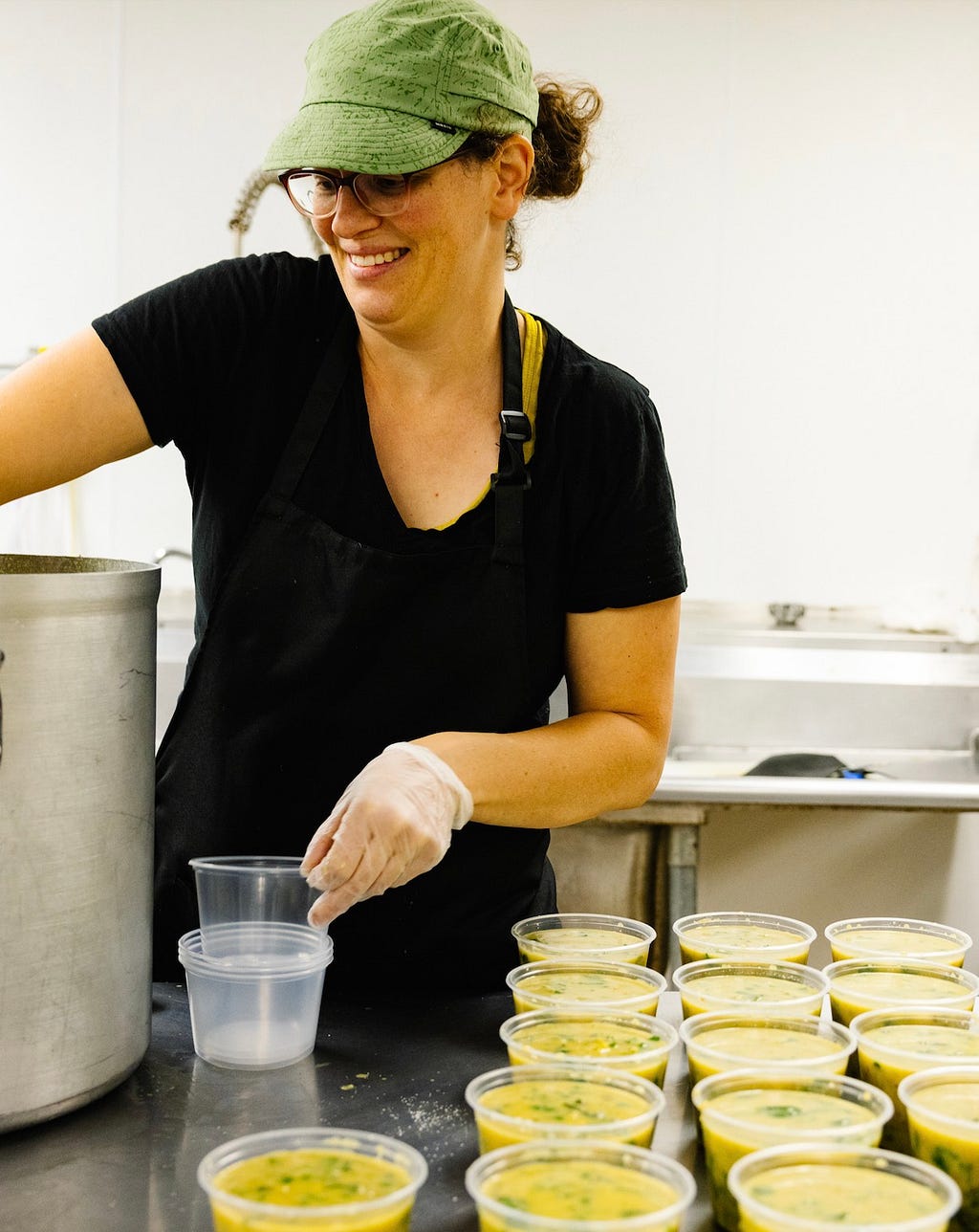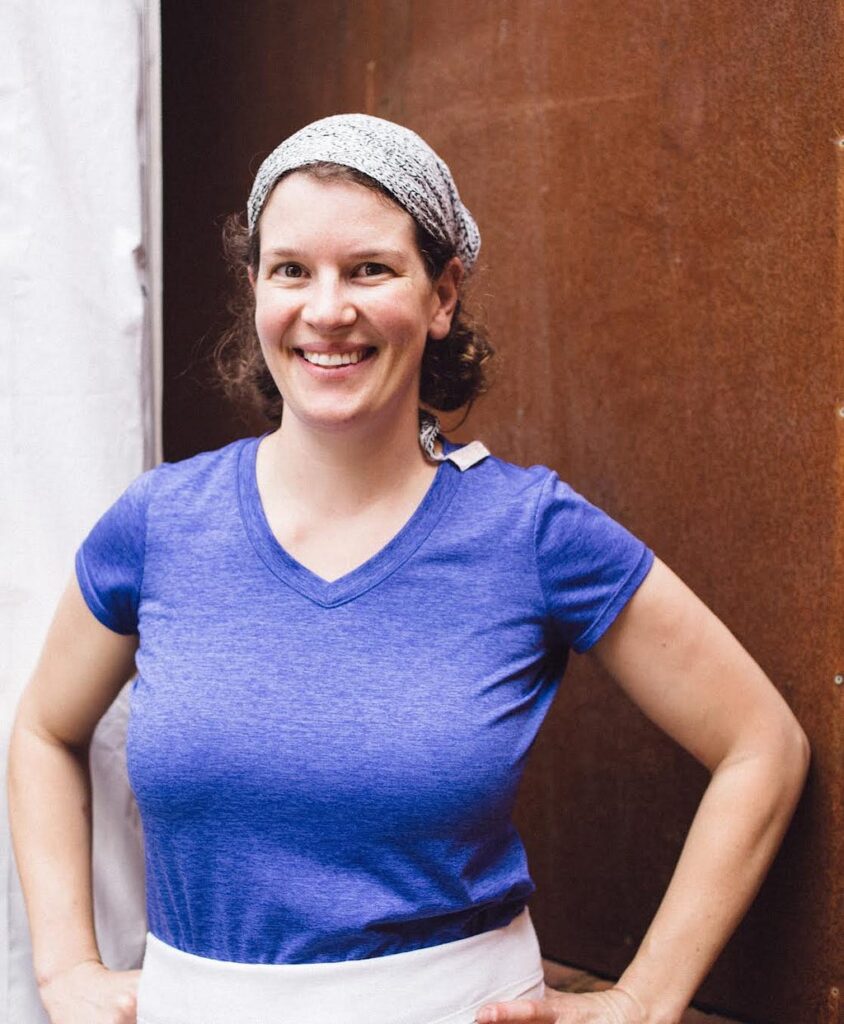Tova Boehm of Short Winter Soups: Five Strategies Our Company Is Using To Tackle Climate Change & Become More Sustainable
An Interview With Martita Mestey
Keep your employees happy — They are often your biggest asset, and keeping them happy and appreciated is better in the short and long term for your business.
As a part of our series about how companies are becoming more sustainable, we had the pleasure of interviewing Tova Boehm.
With a background in sustainable agriculture and value-added markets, Tova Boehm launched Short Winter Soups in 2010. Primarily through word of mouth, Short Winter Soups has grown from a small venture to a popular and well-known source for high integrity soups in central NC. Tova is passionate about supporting local food systems, waste diversion, and sharing her love of cooking with people of all ages and backgrounds.
Thank you so much for doing this with us! Can you tell us a story about what brought you to this specific career path?
Working for myself has always been something that interested me. In college, I arranged a work trade with the local food cooperative, making hummus for them in exchange for meals during the week. Two years later, after a summer working as a bread baker in my hometown, I returned for my senior year with new bakery skills and asked the co-op team if I could launch and run a small bakery out of their space. They agreed, and I began spending Saturday afternoons mixing doughs and Sunday mornings baking and selling the bread. I’d finish homework while the bread was rising and wash the dishes while the bread was in the oven. Students and faculty would line up for fresh, hot bread and pastries midday on Sundays. I’d sell out quick and make plans to increase production the following week. It felt good to create in this way and send out this nourishing food to my community. After I graduated, I took the experience with me, hoping I’d have the opportunity to feed my community in other ways.
What is the mission of your company? What problems are you aiming to solve?
Short Winter Soups makes inspired, high-integrity soups for every season. We’re all about using soups as a vehicle for celebrating NC-grown produce year-round and supporting the growers and producers who make it all possible.
I started Short Winter Soups as a response to:
- The lack of nutritionally dense, vegetarian prepared foods products that capitalize on NC’s agricultural market.
- The demand for buyers of surplus and “G2” produce from small farms. (G2 refers to oversized, undersized, or blemished produce that is deemed unfit for retail markets.).
So, how does our solution uniquely address these problems?
Short Winter Soups purchases hundreds of pounds (and in the summer thousands of pounds) of NC-grown produce each month. This produce, in turn, is made into 40+ different soups sold directly to consumers through area farmers’ markets and a subscription.
For customers wishing to prioritize a vegetarian or plant-based diet, our soups make it convenient and delicious to do so. For growers, it means that Short Winter Soups buys up the excess and G2 produce that would ordinarily go unsold, which reduces waste while supporting growers, their teams and their farms.
Can you tell our readers about the initiatives that you or your company are taking to address climate change or sustainability? Can you give an example for each?
Plant based — our soups are 100% vegetarian. Study after study shows that reducing the consumption of meat, especially red meat, is a simple way to positively impact the environment.
Waste diversion — we take this very seriously by utilizing as much of each ingredient as possible, donating leftovers, composting and recycling (including hand delivering plastic film, which cannot be recycled curbside, to county solid waste sites)
Plastic Neutral — we are certified Plastic Neutral through rePurpose Global, the world’s first plastic credit platform. Through our partnership, we fund the recovery of as much plastic waste as we generate in the production, packaging and distributions of our soups.
How would you articulate how a business can become more profitable by being more sustainable and more environmentally conscious? Can you share a story or example?
Sustainability initiatives are very trendy right now, and for good reason. More and more consumers are committed to causes like combating climate change and reducing their footprint and are looking for brands that prioritize and echo these concerns. Just as consumers are tracking our sustainability initiatives, we are doing the same with companies that we are purchasing from. Support brands that are taking bold steps in environmental stewardship and creating equitable food systems.
Our purchasing philosophy is one built on relationships and is one that distinguishes us from other brands offering a similar product. Over 65% of our ingredient costs go to NC-grown and made ingredients, and we are aggressively seeking out the made/grown-in-state alternative to anything we can purchase from a distributor. For example, we use (and love) American Miso Master, which is made in Rutherfordton, NC. It would be cheaper to buy miso from a distributor, but why do that, when we can get it from a manufacturer that’s just 3 hours from our kitchen? Communicating our purchasing philosophy with consumers has only increased our profitability.
Interestingly, I first learned about the Plastic Neutral certification (noted in the previous question) from American Miso Master, and this only reiterated my commitment to purchasing from them.
The youth led climate strikes of September 2019 showed an impressive degree of activism and initiative by young people on behalf of climate change. This was great, and there is still plenty that needs to be done. In your opinion, what are a few things parents should do to inspire the next generation to become engaged in sustainability and the environmental movement? =
- Promote reuse — Look for ways to reuse, repurpose and fix items before discarding them, whether in the landfill or in recycling. Recycling is a great resource in communities where it is available, but there’s so much more that can be done upstream in reusing and repurposing. For our kids’ birthday parties, we ask for hand-me-down gifts only (nothing brand new).
- Build good habits and lead by example. It’s easy to get overwhelmed by all the things you could or should do to lead a more sustainable life and feeling like if you can’t do something grand, does it really make a difference? Building small, good habits, bit by bit, reinforces goal setting and the ways we can create change within our own lives. I keep a box of mugs and cups in my car, so that whenever I go to a coffeeshop, I’m using one of mine instead of another single-use cup. It’s so little, but more often than not, someone says to me “that’s such a good idea” or “I didn’t realize I could bring my own cup.”

What are your “5 Things I Wish Someone Told Me Before I Started” and why?
- Recognize your gifts and your weaknesses — figure out what you’re good at and outsource or hire in help for everything else.
- You can’t make everyone happy — do spend time listening to all the asks, wants and suggestions, but be realistic that it’s not possible to please everyone.
- Just because you could doesn’t mean you should — take the time to clarify what you will and won’t do, then stick to it. Otherwise, you’ll waste time pursuing channels that dilute your brand. Just because someone suggests you should do something doesn’t mean that you should.
- Keep your employees happy — They are often your biggest asset, and keeping them happy and appreciated is better in the short and long term for your business.
- Trust your instinct — You know your business better than anyone else, and while it’s easy to internalize what everyone else says (see #2 & #3), usually your instinct is solid and should not be overlooked.
None of us are able to achieve success without some help along the way. Is there a particular person who you are grateful towards who helped get you to where you are? Can you share a story about that?
My family has been instrumental in the success of Short Winter Soups. My parents, siblings and spouse have all encouraged me, given me honest feedback, helped me troubleshoot when I’ve been stuck, and held me accountable.
More recently, I am very grateful to my manager. She does so much behind the scenes to make the business run smoothly and efficiently, and really excels at people-facing roles with sales and managing our kitchen team. Moving her from an hourly kitchen employee to a salaried manager was one of the best decisions I made and reiterates point #1 from the question above about what I wish someone had told me before I started. She is more successful at most of these aspects than I ever was, which means the business is that much more successful.
You are a person of great influence and doing some great things for the world! If you could inspire a movement that would bring the greatest amount of good to the greatest amount of people, what would that be? You never know what your idea can trigger. 🙂
This is a great question with so many possibilities. I’ve been thinking recently about ways to aggressively incentivize behaviors, policies and innovations to help curb climate change and create equitable systems and communities for all.
Do you have a favorite life lesson quote? Can you tell us how that was relevant to you in your own life?
There’s a Native American saying, “Give thanks for unknown blessings already on their way.” It’s a good reminder that our actions ripple outwards and inwards, and we live in a dynamic and ever-changing world.
What is the best way for our readers to continue to follow your work online?
@shortwintersoups on social media and via shortwintersoups.com
This was so inspiring. Thank you so much for joining us!
Thank you for this opportunity to share our story.
Tova Boehm of Short Winter Soups: Five Strategies Our Company Is Using To Tackle Climate Change &… was originally published in Authority Magazine on Medium, where people are continuing the conversation by highlighting and responding to this story.
